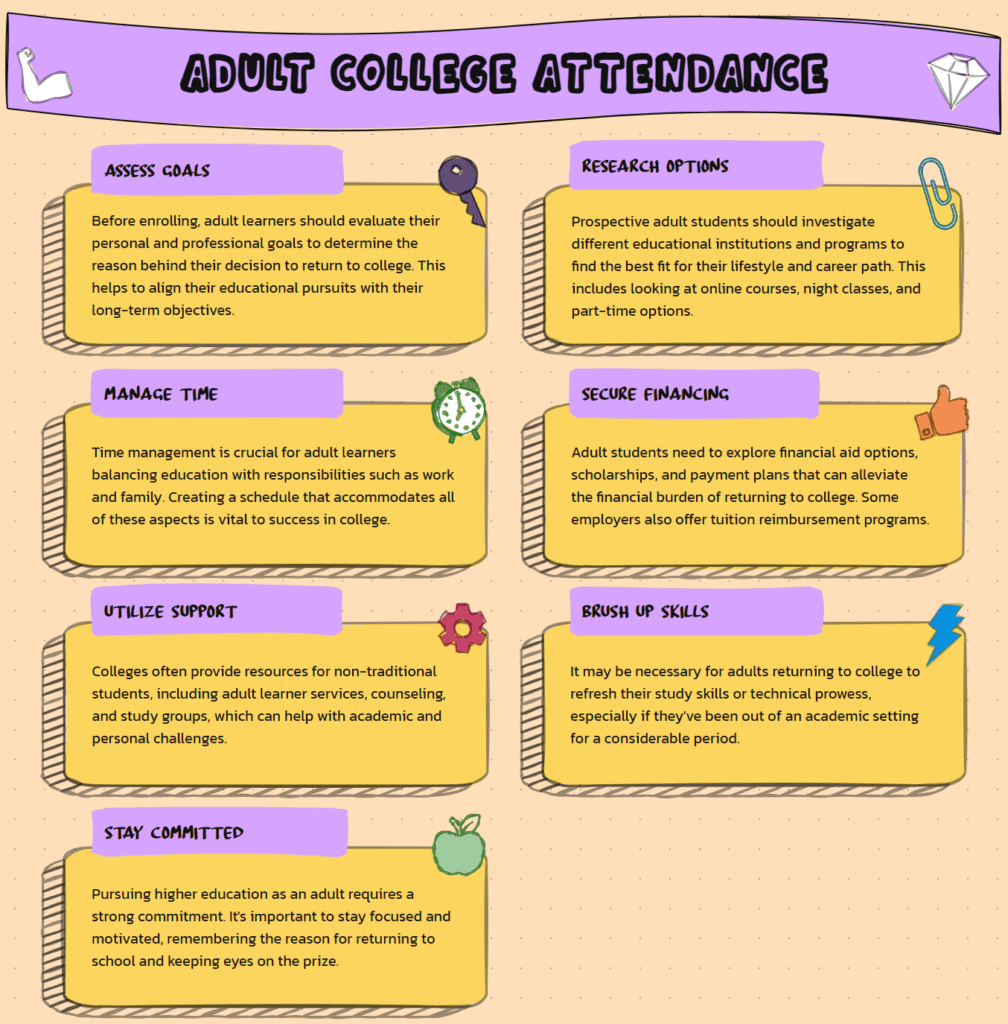Thinking about going back to school as an adult can feel like a massive step. Did you know 1 in 10 college students is over the age of 40? This article breaks down how you can manage work, life, and hitting the books again.
Get ready for a brighter future!
Key Takeaways
Adults can successfully balance work, life, and school by using time management tools and setting clear goals. Starting slowly with one or two courses helps ease the transition back into academic life.
Financial aid is available for adult learners through FAFSA, scholarships, and sometimes employer benefits. This aid makes going back to school more affordable.
Support systems are crucial for adult students. They include family, friends, fellow students, advisors at school, and professional networks. These supports help manage stress and keep you focused on your goals.
Choosing the right program means looking for flexibility that fits your busy life. Online classes offer a way to learn from home on your own schedule.
Returning to college as an adult boosts personal development and career prospects. It opens doors to higher earnings potential over a lifetime compared to those without degrees.
Table of Contents
Overcoming Adult Education Concerns

Jumping back into studying can feel like climbing a mountain in flip-flops. But, armed with the right tools like time management apps and a splash of courage, you’ll start seeing it as just another hill to hike.
Easing into Academic Life
Starting college again can feel like jumping into a cold pool. It shocks the system at first, but you get used to it with time. The trick is to start slow and steady. Begin by taking one or two courses, especially if they’re online classes.
This way, you ease into the routine without overwhelming yourself. Think about it as warming up before a big game.
The key to success is starting small and building confidence step by step.
Also, don’t shy away from using resources designed for students like you. Tools such as write my essay online services can be lifesavers on busy days or when deadlines loom large on your calendar.
Franklin University’s quick feedback on papers helps too; it’s like having a coach in your corner who’s always ready with advice. Get comfortable asking for help because every champion needs a team behind them.
Balancing Work, Life, and Studies
Juggling a job, family time, and school is like being in a three-ring circus. You’ve got to keep all the balls in the air without dropping any. Here’s the trick: lean on time management tools.
Think of planners or apps as your personal assistants. They help plan out each day so you’re not caught off guard by a project due at work or an exam for college.

Make each minute count by setting clear goals for every aspect of your life – from office tasks to homework assignments. And let’s not forget about rest and exercise; they are just as crucial for keeping your mind sharp and energy up.
It’s like fitting pieces into a puzzle; when everything has its place, balancing work, life, and studies becomes doable rather than daunting.
Navigating Financial Hurdles for Adult Learners

Facing money troubles head-on can feel like climbing a mountain. But, with tools like the FAFSA and scholarships, adult students find paths through the financial forest to fund their education dreams.
Alleviating Money Worries
Money worries can hit hard, especially when you’re aiming to get back to school and balance life’s many tasks. Good news: options are out there to lighten the load. Financial aid is a big helper, from grants that don’t ask for payback to federal student loans with lower interest rates.
Don’t let the thought of tuition fees scare you away from reaching your goals.
Start by downloading a free report on maximizing FAFSA benefits—it’s like finding treasure in your backyard! This guide can show you how financial investment in education pays off big time down the road.
Franklin University makes this easy with flexible online courses, helping adult students manage their costs without putting life on hold. The key is knowing where to look and taking action; your future self will thank you for it!
Finding and Applying for Financial Aid
Going back to school might feel like juggling flaming torches. You’ve got bills, maybe a family, and now tuition. But fear not; financial aid can be your safety net. Here’s how to grab that net without getting burned:
- Dive into the Free Application for Federal Student Aid (FAFSA). This form is your golden ticket. It opens doors to grants, loans, and work-study options. The best part? You don’t need to pay back grants.
- Scout for scholarships like it’s a treasure hunt. Scholarships are piles of money waiting for you to claim them. Look beyond the obvious places. Local businesses, nonprofits, and professional associations often hold unclaimed treasures.
- Get cozy with your school’s tuition aid office. These folks know the ropes and can guide you through the maze of available aids.
- Don’t shy away from work-study programs. They let you earn money by working part-time jobs related to your studies or helping the community.
- Check if your employer would pitch in; some companies help employees with tuition as part of their benefits package.
- Stay on top of deadlines like a hawk watches its prey; missing a deadline could mean missing out on free money.
- Keep all your documents organized in one place; this will make applying easier and faster.
Financial aid can soften the blow to your wallet and help keep your bank account healthier than before you decided to hit the books again!
The Role of Support Systems for Adult Students

Support systems are like a safety net for adult students. They catch you when juggling life, work, and studies gets tough. Imagine having someone to review your papers within 24 hours or getting advice tailored just for you.
That’s what Franklin University and Rollins College do. They offer the Student Learning Center, feedback loops, personalized advising, smaller class sizes, and well-being resources.
These services make a big difference in tackling college rules and staying healthy while chasing that degree.
A good support system can turn stress into success.
Colleges understand the struggles of balancing everything on your plate. So they create environments where learning styles meet personal needs. Tutoring, mental health resources like counseling sessions or meditation workshops, study groups – these tools help manage stress and keep you focused on your goals.
They’re not just there for show; they are crucial pieces of the puzzle to keep you moving forward without burning out.
Life-Education Balance Strategies

Juggling life and school? You’re not alone. Many find this dance tricky but essential for success. Think of it as spinning plates, where each plate is a part of your life – work, family, hobbies, and studies.
Mastering time management is like finding the secret sauce. It’s all about planning your week so you can fit in study sessions without missing out on family dinners or soccer games.
Picture yourself using apps to keep track of assignments and deadlines, or setting alarms to remind you when it’s time to hit the books.
Building a strong support network is another key strategy. This means having folks around who get what you’re going through – maybe a study buddy from class or a family member who cheers you on when exams loom large.
They’re like your personal cheerleading squad, always there to keep your spirits high.
Together, these strategies create a sturdy bridge between your educational goals and daily life responsibilities. They make sure you don’t drop any plates while chasing down that diploma.
Mastering Time Management
Time flies, especially when you’re spinning multiple plates like work, home, and hitting the books again. Nailing down time management can turn chaos into a smooth ride. Here’s how to make each tick of the clock count:
- Break your day into blocks. Treat studying like it’s part of your job. Set aside clear chunks of time for lectures, reading, and homework. This approach keeps everything in its own box, so tasks don’t spill over and swamp you.
- Make lists your new best friend. Start each day with a battle plan: what you need to do and by when. Crossing items off as you complete them isn’t just satisfying; it keeps you on track.
- Get tech-savvy with apps. Tools like calendars and to-do list apps aren’t just shiny digital toys; they’re lifesavers for keeping tabs on deadlines and appointments.
- Say no to procrastination vampires. Social media can suck up your precious time without you even noticing. Carve out specific times for checking feeds so they don’t eat into study hours.
- Prioritize like a pro. Not every task is created equal. Decide what needs immediate attention and what can wait a bit longer without the sky falling down.
- Learn the art of delegation at home or work, wherever possible Free up more time for your studies by sharing chores or tasks with others.
- Embrace short study sessions if that’s what fits your schedule better. Sometimes shorter but more intense focus periods are more productive than trying to marathon through material.
- Remember, sleep is not optional! Burning the midnight oil too often can backfire by dulling your brainpower when you most need it sharp.
- Take breaks to avoid burnout Stretching your legs or just zoning out for a few lets you come back to studying with fresh eyes – and possibly new solutions to tough problems.
Following these steps won’t add hours to your day but will help make the ones you have work harder for you.
Building a Strong Support Network
Mastering how to manage your time is crucial, but so is knowing you’re not in this alone. Building a strong support network can turn the tide in your favor.
- Start with family and friends – Let them know about your goals. They can offer a listening ear or even help with household tasks when you’re drowning in homework.
- Connect with fellow students – Join study groups or online forums. These people get what you’re going through because they’re in the same boat.
- Lean on advisors at school – Places like Franklin University assign you an advisor for a reason. Use their knowledge to navigate course decisions and relieve academic stress.
- Make use of student services – From writing centers that give feedback on papers within 24 hours to counseling for stress management, schools have resources designed to support you.
- Network with professionals in your field – Not only can they provide guidance, but they might also offer job leads or internships once you graduate.
- Utilize social media for support – LinkedIn groups, Facebook communities, and even Twitter can connect you with mentors and peers worldwide.
- Don’t overlook emotional support – Sometimes, talking to a professional therapist or counselor makes all the difference in managing school pressure alongside life’s challenges.
- Build a routine that includes others – Whether it’s weekly family dinners where you share updates or coffee breaks with colleagues, mixing social activities into your schedule boosts morale and keeps you grounded.
Remember, every step forward is progress, and every person in your corner counts double towards reaching that finish line.
Selecting the Appropriate Program

Choosing the right course feels like picking a new phone; it’s all about matching features with needs. If flexibility sings your song or online lectures fit like a glove, keep those top of mind when hunting for degrees.
Flexibility and Adult Learning
Flexibility is key for adults hitting the books again. Imagine juggling a job, family responsibilities, and then adding class schedules on top of that. Online education steps in as a hero here.
It lets you attend lectures from your living room or even a coffee shop if that’s your scene. You pick the time that works best for you.
Selecting the right program means finding one that bends but doesn’t break with your busy life. Rollins College gets gold stars for letting students blend work with study effortlessly.
They understand not everyone can be in a classroom during traditional hours. This approach to learning ensures you don’t have to put your life on hold to get ahead in it.
Assessing Programs for Adult Students
Choosing the right program is like picking the best tool for a job. For adult students, flexibility in schedules and types of classes (online or in-person) can make a big difference.
Look for programs that offer online learning options, which are great for fitting into busy lives. Also, check if the college has services to support adult learners. Franklin University shines here with its Student Learning Center.
Education isn’t one-size-fits-all, especially for adults juggling more than just school.
Consider how well a program matches your career goals, too. Does it offer courses that update your skills? Can it help you shift careers if that’s your aim? Look into whether employers respect degrees from the institution.
Adult students should also weigh the cost against potential increases in earnings after graduation. It’s smart to think about student loan debt and personal well-being together when making this choice.
Benefits of Returning to School as an Adult

Going back to school as an adult can kick your career into high gear. It’s like hitting the refresh button on your job prospects and personal growth.
Personal Development
Going back to school kicks your personal growth into high gear. You get to meet new people, learn from experienced professors, and tackle challenges that make you stronger. Schools like Franklin University and Point Loma offer support services that boost this growth.
They help adult students like you develop resilience, problem-solving skills, and a positive mindset. This isn’t just about getting smarter; it’s about becoming the best version of yourself.
Adult learners flourish in college settings. They build self-esteem by conquering academic hurdles and interacting with peers from diverse backgrounds. These experiences contribute to a well-rounded personality capable of handling life’s ups and downs with grace.
Whether you’re aiming for an associate degree or graduate-level education, college paves the way for lifelong learning and emotional health improvement.
Enhancing Career Prospects
Building on personal development, advancing your career becomes the next logical step. Men with bachelor’s degrees can earn up to $900,000 more over their lifetimes than those without, as shown by the Social Security Administration.
This hefty sum makes returning to school a smart play in the long run. You’re not just chasing instant gratification; you’re setting up for big wins in economic downturns and recessions.
Choosing to study again is often about more than letters of recommendation or acing your admission process. It’s about securing employment in fields ripe for growth, such as cybersecurity, where being laid off becomes less of a worry thanks to high demand.
With an online degree, balancing life’s responsibilities while studying becomes doable, making it possible to thrive even when the curveballs of life come at you fast.
FAQs About How to Go to College as an Adult
Can I really start college as an adult?
Absolutely! It’s like riding a bike, but instead of two wheels, you’ve got books and online courses. Whether you’re aiming for a promotion or just chasing a dream, it’s never too late to hit the books.
How do I pick the right program?
Think of it as ordering from a huge menu – overwhelming at first, but thrilling once you find what makes your heart sing. Dive into the curriculum that lights up your brain and aligns with your goals. Online college can be a game-changer if you’re juggling life’s other big tasks.
Is online learning effective for adults?
You bet! It’s like having class in your pajamas without anyone knowing. Online courses are designed to fit into your hectic schedule, allowing you to learn at your own pace without sacrificing family time or work hours.
How do I keep my spirits up and stay motivated?
Picture positive psychology as your personal cheerleader, keeping those positive thoughts flowing and mood high. Create mind maps to visualize success; they’re not just fancy doodles, but powerful tools for goal-oriented folks like yourself.
What if I’m struggling with balancing everything?
Imagine juggling balls labeled ‘work’, ‘family’, and ‘school’. Now picture one dropping – it happens! The key is not beating yourself up about it but picking it back up with grace (and maybe a little humor). Remember, flourishing in this new chapter is all about finding that sweet spot between hustle and self-care.




